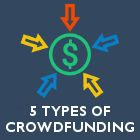
Crowdfunding Models For Startups
4 Crowdfunding Models Your Startup Can Use to Raise Capital
Have you been thinking about using a crowdfunding model to launch your startup?
Then you may want to understand the 4 basic types of crowdfunding models and the financial and legal implications of each one.
Before you go online and start asking friends and family for money, get yourself up to speed on the various crowdfunding models available and the benefits and drawbacks of each.
The Four Basic Crowdfunding Models
The Crowdfunding models are distinguished by what the contributors are given in exchange for their investment. There are different websites that specialize in each of these crowdfunding models.
The main crowdfunding models these sites use include:
- The donation based model
- The pre-purchase model
- The lending based model
- The equity crowdfunding model
Keep in mind that some sites use a hybrid crowdfunding model. This is most common with the donation and pre-sale crowdfunding models.
The Donation-Based Crowdfunding Model
As the name suggests, donation crowdfunding sites allow contributors to donate to causes or projects they care about. Contributors are not offered a product or an ownership stake (equity) in a company for their donation. Donors give for a charitable reason to help out a project they feel passionate about.
One example of a donation based crowdfunding model in action is CrowdRise.com. CrowdRise is the world’s largest charitable crowdfunding site. The site allows anyone to fundraise for charitable or personal causes. Hundreds of millions of dollars have been raised in the past few years on this site alone.
While the donation crowdfunding model can sometimes be used by innovative small startups, it is generally not suitable for a for-profit business start-up.
The Pre-Purchase Crowdfunding Model
The pre-purchase crowdfunding model allows you to sell your product before it has even been created. You do need to have a concept and the ability to fulfill orders within a reasonable amount of time. On sites like Kickstarter and IndieGoGo you can take orders and payments for the orders and offer products and rewards to purchasers before you build your product. The payments for the orders can be used to produce the products.
This is the most common form of crowdfunding model out there today.
The Lending Crowdfunding Model
The lending crowdfunding model allows contributors to give small, usually short term loans. The leading site for this Crowdfunding Model is Kiva.org. Kiva has helped almost 2 million students and entrepreneurs in developing countries to get access to small loans via the lending based crowdfunding model. These loans do need to be repaid within a reasonable period of time.
The Equity Crowdfunding Model
Under the equity crowdfunding model investors are purchasing an ownership interest (equity) in the business. This means the business is actually selling stock to raise startup capital.
In 2012 Congress passed the JOBS Act to make it easier for startup businesses to raise money via equity crowdfunding. It has taken some time for the SEC to fill in the gaps and issue the regulations under this new law. These regulations will be effective in May of 2016. By the end of May 2016, we expect to see more and more startups selling securities to raise money under this equity crowdfunding model.
Since this is such a new field we do not wish to link to or endorse any new site using the equity crowdfunding model. But rest assured that there will be dozens popping up in the coming months and years.
Some of these Crowdfunding Models require supervision
Before you jump into crowdfunding you may need to get some legal advice. This is especially true if you plan to use the equity crowdfunding model.
Get in touch with us at JGPC Law by calling Jim Gulseth at 925 463 9600 Ext. 250 (jgulseth@jgpc.com). We can help you raise the money to build your business and stay clear of all the legal pitfalls in your path.
The content presented in this article is for general informational purposes only. It is not, nor is it intended to be, legal advice. It does not constitute the formation of an attorney-client relationship. Contacting us does not create an attorney-client relationship. Please do not send any confidential information to us until such time as an attorney-client relationship has been established.